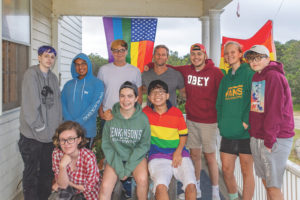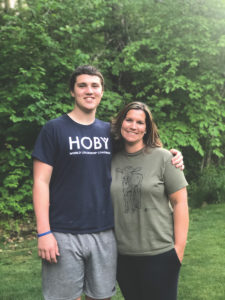For many in the LGBTQ community, annual pride events commemorating the Stonewall uprising of June 28, 1969, have constituted their first euphoric moments of connection, of celebration, of feeling recognized and accepted.

“I came out in the early ’80s, and going to my first pride parade in Boston was an indescribable experience,” says Rick Miller, a licensed clinical social worker and Truro resident who works in private practice here and Boston. “It gave me goosebumps to have the opportunity to be included in something so big when I had been hiding my entire life.”
With pride events in Provincetown and elsewhere canceled this year due to the Covid-19 crisis, LGBTQ youth, a population that is already vulnerable and may be even more so after months of isolation, have been left without the opportunity to take part in that euphoric connection. This is especially true for young people who don’t live in what Miller calls the “bubble of liberal acceptance” on the East Coast and on the Outer Cape in particular.
“We imagine and hope that everyone is doing better than previous generations, but that is, in fact, not true. There is a lot of pain out there,” Miller says. “And, of course, depending on one’s ethnic group and the norms of those groups, it can be even harder for young people.”
According to Amit Paley, CEO and executive director of the Trevor Project, the world’s largest suicide prevention and crisis intervention organization for LGBTQ youth, the pandemic has exacerbated the situation.
“We know that positive social connections are vital for suicide prevention,” Paley says. “And since the onset of Covid-19, we have heard from many LGBTQ young people who find themselves in an environment that does not affirm their identity, or places them at risk for abuse.”
Puck Markham, the founder of Camp Lightbulb, a nonprofit camp for LGBTQ youth, confirms that growing up can be “a very isolating and lonely, lonely period.” Markham launched Camp Lightbulb in 2011 in Provincetown. “Often, it is much harder for LGBTQ youth to find peers and experiences that are positive,” Markham says. “And that’s very much what the camp provides and what Provincetown allows us to do.” Markham has since added summer camps in a number of other locations as well.
This year, Camp Lightbulb’s ninth season was scheduled to take place during the first three weeks of July, but because many of the nearly 95 campers who had signed up were traveling from all over the country, Markham made the difficult decision to cancel. “So many kids are really sad about this,” he says. “So, we decided to see if there was something that we can do online.”
A trial virtual Camp Lightbulb took place in April, with 38 campers from all across the U.S. and Canada. “We had a pride and a prom party, all online,” Markham says. “It was amazing to see how connected the kids felt and how some of the basic things about camp, which is about community and making friends, happened online as well.”

“We normally try to get our campers involved with members of the community and the different events that are going on, to immerse them in P’town during the time that they’re there,” says camp director Amy Kerr. “Now, of course, we have to adapt to the virtual experience, and attending a drag show or a dance party on the computer is different than being able to interact in person.”
Fourteen-year old Ash, from New York, who identifies as pansexual, says that the experience helped her meet more LGBTQ friends and help others understand who they are. “Camp Lightbulb is like a family to me,” Ash says. “Everyone is so sweet and caring.”
Markham says that because the cost of virtual camp is so much lower, teens can sign up independently of their parents, and he hopes that “this may be an opportunity to reach more kids, especially those whose parents might not be supportive.”
Irrespective of Covid-19, Miller says that the opportunities to connect online are often “a salvation to LGBTQ youth.” He is currently conducting an online photo project titled “Gay Sons and Our Moms,” which is intended to validate the significance of a mother’s role in her gay son’s life. Miller posts the photos he receives regularly on Instagram (#gaysonsandmothers) and says the comments added by others have been “incredibly supportive. I am getting young followers from all over the world who are immensely grateful to see photos and hear vignettes and stories from other gay boys and gay men and mothers of gay boys around life being okay.”
If you identify as part of the LGBTQ community and find yourself in need of help or support, the Trevor Lifeline can connect you to trained counselors 24 hours a day: 866-488-7386. You can also find help online via chat/text services at thetrevorproject.org/get-help-now.
